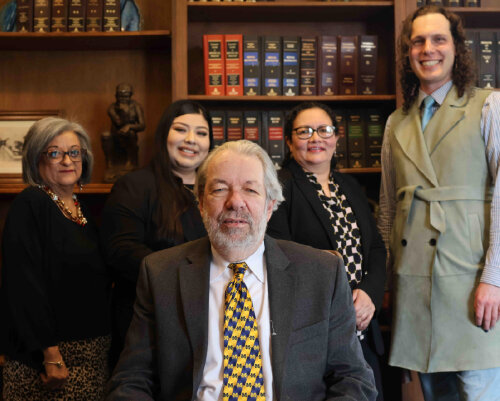Best Toxic Tort Lawyers in Grand Rapids
Share your needs with us, get contacted by law firms.
Free. Takes 2 min.
List of the best lawyers in Grand Rapids, United States
About Toxic Tort Law in Grand Rapids, United States:
Toxic Tort law in Grand Rapids pertains to legal cases where individuals or groups seek compensation for injuries or damages caused by exposure to toxic substances. These cases can involve pollution, hazardous chemicals, pharmaceutical drugs, or other harmful substances.
Why You May Need a Lawyer:
You may need a lawyer in Toxic Tort cases if you have suffered health issues or property damage due to toxic exposure. An attorney can help you navigate complex legal processes, gather evidence, and seek fair compensation for your losses.
Local Laws Overview:
In Grand Rapids, toxic tort cases are governed by state and federal laws related to environmental protection, product liability, and personal injury. It is crucial to understand these laws and their implications for your case.
Frequently Asked Questions:
1. What qualifies as a toxic tort case?
A toxic tort case involves harm caused by exposure to toxic substances such as chemicals, pollutants, or hazardous materials.
2. How can I prove a toxic tort claim?
Proof of exposure, causation, and damages is key in establishing a toxic tort claim. Evidence such as medical records, expert testimony, and environmental reports is crucial.
3. What compensation can I seek in a toxic tort case?
You may be entitled to compensation for medical expenses, lost wages, pain and suffering, property damage, and punitive damages in a toxic tort case.
4. Is there a time limit for filing a toxic tort lawsuit in Grand Rapids?
Yes, there is a statute of limitations for filing toxic tort lawsuits in Grand Rapids. It is important to consult with a lawyer promptly to ensure timely filing.
5. Can a class action lawsuit be filed for toxic tort cases?
Yes, toxic tort cases involving multiple plaintiffs can be consolidated into a class action lawsuit for efficiency and cost-effectiveness.
6. How do I choose the right attorney for my toxic tort case?
Look for attorneys with experience in toxic tort litigation, a track record of successful cases, and a strong reputation in the field.
7. What role does the government play in regulating toxic substances in Grand Rapids?
The government enforces regulations on toxic substances through agencies such as the Environmental Protection Agency (EPA) and the Michigan Department of Environmental Quality (MDEQ).
8. Can I file a toxic tort claim against a company or individual responsible for toxic exposure?
Yes, you can file a toxic tort claim against entities responsible for toxic exposure, such as corporations, manufacturers, or property owners.
9. What are some common toxic tort cases in Grand Rapids?
Common toxic tort cases in Grand Rapids may involve exposure to lead paint, asbestos, industrial chemicals, or contaminated groundwater.
10. How long does a toxic tort case typically take to resolve?
The duration of a toxic tort case can vary depending on factors such as complexity, evidence, and settlement negotiations. It is advisable to consult with an attorney for a realistic timeline.
Additional Resources:
For more information on toxic tort law and resources in Grand Rapids, you can contact the Michigan Bar Association, the Environmental Law Section of the State Bar of Michigan, or the EPA Region 5 office.
Next Steps:
If you believe you have a toxic tort case in Grand Rapids, it is important to consult with an experienced attorney who can evaluate your claim, guide you through the legal process, and help you seek the compensation you deserve.
Lawzana helps you find the best lawyers and law firms in Grand Rapids through a curated and pre-screened list of qualified legal professionals. Our platform offers rankings and detailed profiles of attorneys and law firms, allowing you to compare based on practice areas, including Toxic Tort, experience, and client feedback.
Each profile includes a description of the firm's areas of practice, client reviews, team members and partners, year of establishment, spoken languages, office locations, contact information, social media presence, and any published articles or resources. Most firms on our platform speak English and are experienced in both local and international legal matters.
Get a quote from top-rated law firms in Grand Rapids, United States — quickly, securely, and without unnecessary hassle.
Disclaimer:
The information provided on this page is for general informational purposes only and does not constitute legal advice. While we strive to ensure the accuracy and relevance of the content, legal information may change over time, and interpretations of the law can vary. You should always consult with a qualified legal professional for advice specific to your situation.
We disclaim all liability for actions taken or not taken based on the content of this page. If you believe any information is incorrect or outdated, please contact us, and we will review and update it where appropriate.








